There is no good time to experience anxiety. But some times are decidedly worse than others. That’s what makes nighttime anxiety so stressful. Everything is quiet and dark and thus amplified. Anxiety at night also takes a very obvious toll. Anxiety in the evening impacts far more than just that evening.
Compromised sleep changes how you go through the following day—and beyond. Your energy will be low, your concentration lacking, and mood swings are more likely. Even one bout of nighttime anxiety is enough to cause its own anxiety from lack of sleep. The cycle builds from there.
Symptoms of Nighttime Anxiety
It can feel much like anxiety at any point in the day. A big difference is that the symptoms are intensified with less happening to distract you. All the following symptoms can feel particularly severe:
- Elevated heart rate, shallow breathing, racing thoughts, and dizziness
- Nervousness, restlessness, feelings of impending doom
- Unexplained pain and tension
- Gastrointestinal disturbances
- Difficulty concentrating
- Nightmares
- Cannot fall asleep or stay asleep
- Panic attacks and dissociation
Why Does Anxiety at Night Feel Worse?
The reasons can vary from person to person, but a consensus exists on the general themes:
- Your routine and behavior before going to bed, e.g. ingesting caffeine, lots of screen time, etc.
- The lack of distractions
- A lot of stress or trauma in your life
- Fixating on perceived physical symptoms
- Worrying about the events of the next day
- Worrying about nighttime anxiety
- Certain medical conditions and/or medications
4 Tips for Managing Nighttime Anxiety
1. Create a Healthy Bedtime Routine
The idea is to not haphazardly wind up in bed at a random time. Plan in advance for what you need to do to ease this process and reduce the odds of anxiety rearing its ugly head. Some suggestions:
- Get to bed at roughly the same time each night. Let your mind and body settle into a rhythm.
- Don’t eat or drink too close to bedtime. Choose what you ingest carefully, since certain foods or drinks can cause digestive problems that increase the odds of anxiety.
- Get exercise and physical activity every day—but not too close to bedtime.
2. Put Away Your Devices
This one gets its own section since it’s become a major issue for so many people. All the notifications, clickbait headlines, and doom-scrolling are enough to send anyone into a tailspin.
The last thing you need to do is hit the sack with all of it bouncing around in your mind. So, power down your devices well before you start the rest of your pre-sleep rituals. You will not regret it.
3. Meditate to Ease Anxiety at Night
Guide yourself into a sleep-friendly state shortly before you turn out the lights. There are countless meditation apps and videos that can teach you the basics. The simple act of sitting still and focusing on your breath has been shown to dramatically decrease anxiety at any time of day.
4. If You Can’t Sleep, Have a Routine for That, Too
If anxiety or panic is looming, get out of bed and shift the focus. Try journaling or reading (as in a real book). Such activities can distract the mind and make your eyes more tired. Either is far better than lying in the dark and thinking about how anxious you feel.
Do Not Take Nighttime Anxiety Lightly
The effect of anxiety on your sleep habits and thus, your life can be huge. If this sounds familiar but you’re having trouble managing it, we should talk. Therapy is a proven method for managing anxiety and developing the skills you need to keep it at bay. We can start this crucial process with a free and confidential consultation, contact me to find out more.






